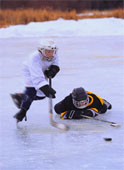By David Wolf, Attorney
Published by Child Injury Lawyer Network

Some parents are calling hockey rings “arenas of aggression,” and there may be some truth to the novel nickname. One parent of a youth hockey player said his 12-year-old child had already sustained three concussions and multiple neck and back personal injuries. Most parents are unaware of the significant, long-term damage concussions can have on children, mainly because the brain is still in developmental stages during one’s youth.
Dr. Michael Cusimano, a neurosurgeon at St. Michael’s Hospital in Toronto, stated that body checking is the most common form of personal injury among youth hockey players. In fact, body checking causes 86% of all personal injuries sustained by youth hockey players between the ages of 9 to 15. Currently, Dr. Cusimano is conducting research to detect the differences between the periods of when body checking was prohibited and now. His research reveals that the lower the ages in the youth athlete the occurrence of concussions increases ten-fold.
Below are a list of symptoms to determine whether or not your child has sustained a concussion: headache, nausea, dizziness, trouble with lights and sounds and memory problems. Some symptoms can be less subtle such as with a child’s concentration or memory.
Another thing parents should be aware of is that if a child sustains a head injury and is returned to play before the initial injury has had adequate time to heal, the child athlete’s chances of sustaining a secondary, more severe and long-term personal injury increases greatly. If you would like to read more on this topic please see Body checking becoming a problem in youth hockey.
Parents should insist that all coaches and trainers go through mandatory training to increase knowledge about and prevention tips on concussions. Concussions are brain injuries and need to be taken seriously and dealt with properly so the young, developing brains of youth athletes will not be permanently damaged.
 Child Injury Lawyer Blog
Child Injury Lawyer Blog

